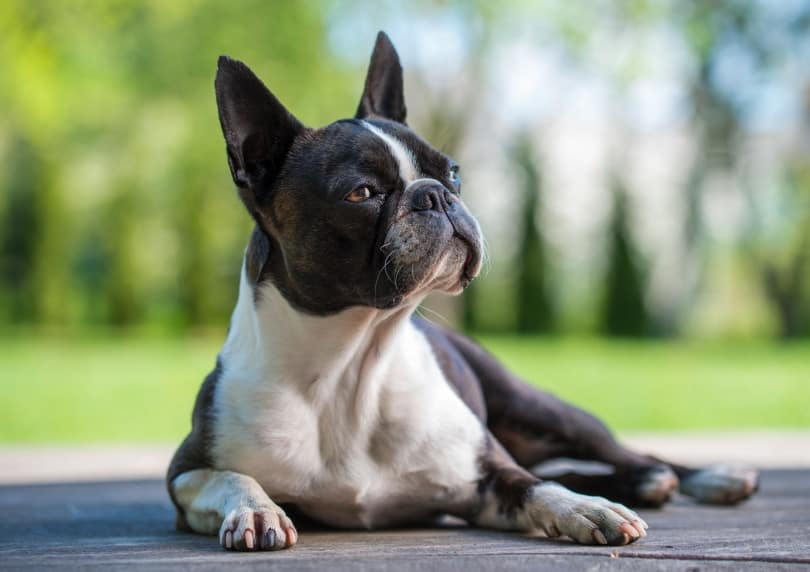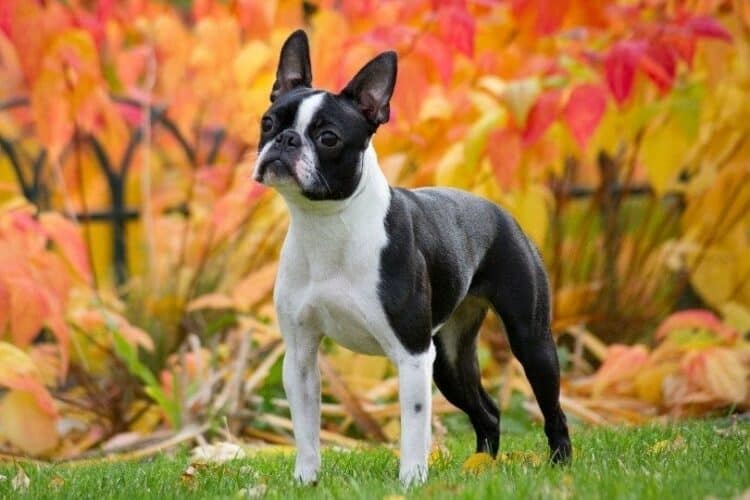Boston Terriers are adorable and fun dogs with spunky attitudes that bring a lot of cheer and laughter into a home. While these dogs make wonderful family companions, they’re not the best dog breed for allergy sufferers. Boston Terriers aren’t hypoallergenic and can trigger allergic reactions.
So, if you or someone you live with has allergies and have been considering adopting a Boston Terrier, you’ll want to think twice. While there are some things you can do to minimize allergy symptoms, dog allergy sufferers don’t typically live with Boston Terriers because their coats don’t help much with managing symptoms.
What Causes Allergic Reactions?
Contrary to popular belief, dog hair isn’t the main culprit for allergic reactions. Rather, most people are allergic to dog dander. This is why Boston Terriers aren’t hypoallergenic dogs. They have a short single coat and shed a lot less compared to other dogs.
While less shedding means that less dander can scatter around the house, Boston Terriers can still trigger allergic reactions simply because of their dander. Dander tends to linger in the air, which makes it difficult to clean.
People can also be allergic to dog saliva, sweat, and urine. This is why dogs marketed as “hypoallergenic” aren’t ever completely allergen-free. Hairless dogs also aren’t exempt, and many often need additional skin care because they don’t have a substantial coat to protect them. So, it’s really difficult to avoid exposure to allergens if you live in a home with dogs.

Managing Allergy Symptoms
If you have minor allergy symptoms, there are some things you can do to make living with a Boston Terrier or any other dog more manageable. Since pet dander can stay in the air, it can be helpful to invest in an air purifier. An air purifier can help by collecting dust and pet dander and filtering the air in the process.
If you have the space, you can also create a designated pet-free room in your home. These types of rooms should have a door that closes securely and some windows to allow air to circulate.
Maintaining Skin and Coat Health
A healthy skin and coat can also do wonders for reducing pet dander. So, it’s essential to be on top of grooming a dog. Regular brushing will reduce the number of stray hairs getting stuck on carpets and furniture. Deshedding tools can also help pick up loose hairs and prevent the spread of dander. Using a bristle brush can also help with picking up dander and debris from a dog’s coat.
Bathing a dog with a shampoo that contains a skin-nourishing formula can also help reduce pet dander. If you notice that your dog tends to have dry skin, try using a conditioner or a conditioning mist to keep your dog’s skin moisturized. Adding skin and coat supplements, such as salmon oil, to your dog’s diet can also keep your dog’s skin healthy.
Not only does treating your dog’s coat reduce dander, but it can also prevent your dog from licking and nipping at its skin. Healthy skin and coat mean that there aren’t any dry spots or irritating rashes for your dog to try to soothe by licking. This can reduce the chances of coming in contact with dog saliva.
Conclusion
Boston Terriers are minimal shedders, but they’re still not hypoallergenic. In fact, no dog breed is 100% hypoallergenic. So, if you’re considering a dog and have allergies, you’ll want to think long and hard about this decision. Some people may be able to manage allergy symptoms while others won’t.
Therefore, if you want to bring home a Boston Terrier, make sure to consult with your physician first. Take the time to weigh out all the pros and cons and work together to see if living with a dog is possible. Both you and the dog should benefit from living life together, and if this isn’t a possibility, it’s best to look for a different pet that better suits your lifestyle.
Featured Image Credit: Shutterstock














